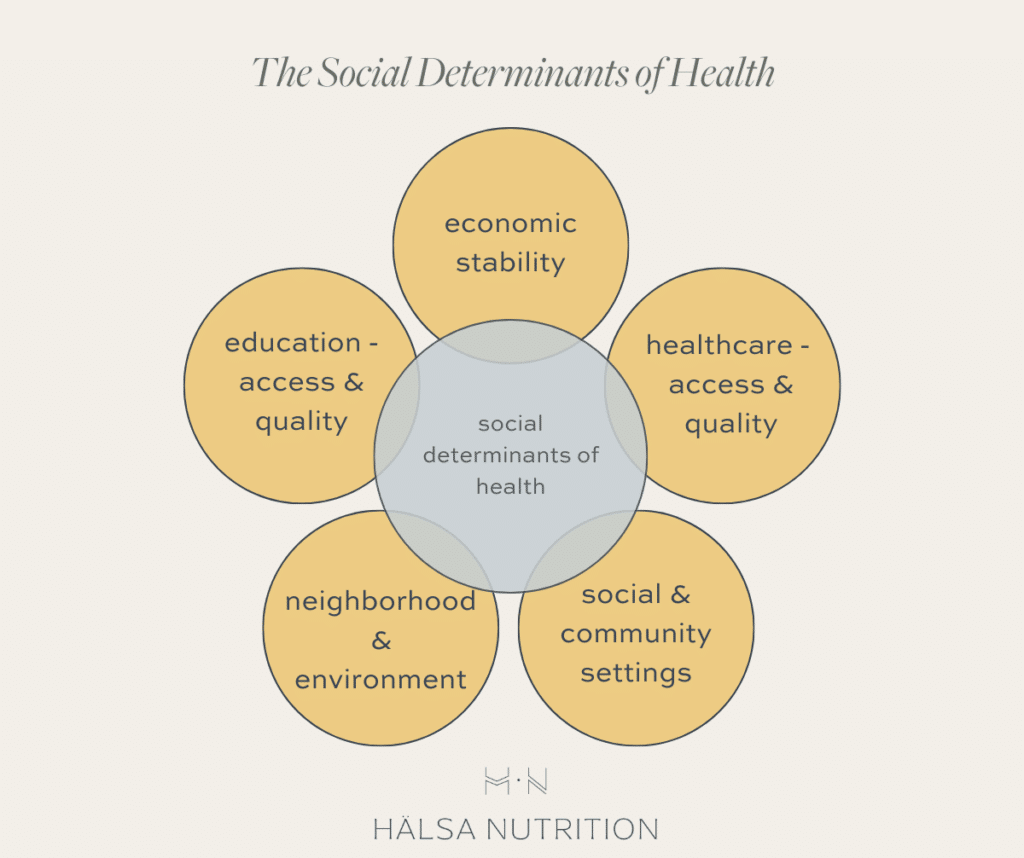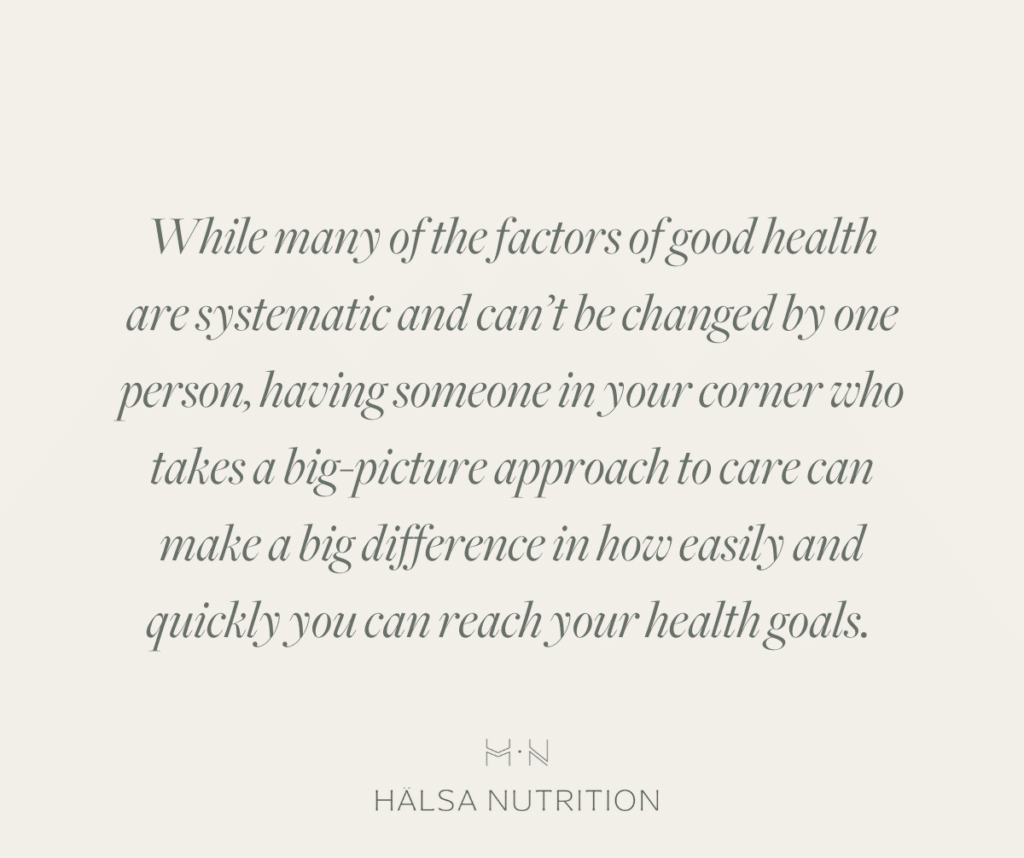
What are the Factors of Good Health?
by Kourtney Johnson, RD, LD
Estimated reading time: 5 minutes
Many factors affect our health and determine the quality of it. While diet culture oversimplifies these influences as simply what we eat, how much we eat, and how much we weigh, the social determinants of health are what research shows make a bigger impact.
The World Health Organization states that “the social determinants of health are the non-medical factors that influence health outcomes.” They make up the situations in which people live, work, and age, as well as the systems and policies that impact those situations.(1)
The social determinants of health include five categories:(2)
- Economic stability
- Education access and quality
- Healthcare access and quality
- Neighborhood and environment
- Social and community settings

Within these categories are factors such as:
- safe housing,
- reliable transportation,
- safe neighborhoods (with sidewalks, bike lanes, green spaces, and playgrounds)
- racism,
- violence,
- job opportunities,
- income,
- access to adequate amounts of food,
- air and water pollution,
- and language skills.(2)
What’s more important in determining health, lifestyle choices, or social determinants?
Diet culture and our society in general often emphasize personal responsibility when it comes to our health. However, research has shown that the social determinants actually play a bigger role in how healthy we are, and affect 30 to 55 percent of health outcomes.(1)
Over time, it has become apparent that simply promoting healthy choices isn’t enough to facilitate change.(2)
So what can be done when people are dealt tough situations and the factors of good health aren’t in their favor?
One study has recommended a variety of ways in which healthcare providers can help their patients overcome factors that can influence poor health. Among the suggestions are:
- Creating safe spaces for disclosing information
- Taking extra time with patients to discuss health and social needs
- Being aware of local resources for different needs

In order to create safe spaces, the study recommends healthcare practitioners avoid stereotyping and be open to cultural backgrounds. This will help develop strong, trusting relationships between providers and patients, which increases the likelihood of patients sharing vulnerable information.
In addition, while time is usually limited for appointments, spending even two to three extra minutes with patients can help. This extra time can improve care and help patients find solutions to their (relatively simple) challenges.
Also, having access to local resources, such as an online directory is important. This can make it easier for healthcare providers to direct their patients to the correct people and programs.(3)
Healthy People 2030 is a framework with national objectives to improve health and well-being during the following decade. It has a strong focus on the social determinants of health with one goal being: “Create social, physical, and economic environments that promote attaining the full potential for health and wellbeing for all.”(2)
The role of an anti-diet dietitian in addressing factors of good health
Maria recognizes the importance of the social determinants of health and takes them into account when working with clients.
While many of the factors of good health are systematic and can’t be changed by one person, having someone in your corner who takes a big-picture approach to care can make a big difference in how easily and quickly you can reach your health goals.

Working one-on-one with clients during 45-minute sessions allows for enough time to address clients’ goals, challenges, and any other pertinent information. Without the focus on weight that so many healthcare professionals have, Maria is able to look at each person’s unique situation and give individualized care and recommendations, instead of standard solutions that don’t typically work for the majority of people.
Of course, that’s where having a trusting relationship with your healthcare provider comes in. When working with Maria through one-on-sessions and messaging when needed, you’ll develop a bond where you are comfortable sharing all types of information for her to best help YOU.
Next steps
If you are interested in learning more about what it looks like to work with Maria, schedule a free Discovery Call here! You will be able to ask questions and the two of you can decide if this program is the right fit for you.
Sources
- Social determinants of health. Who.int. Accessed May 13, 2023. https://www.who.int/health-topics/social-determinants-of-health#tab=tab_1.
- Social determinants of health. Health.gov. Accessed May 14, 2023. https://health.gov/healthypeople/priority-areas/social-determinants-health.
- Andermann A. Taking action on the social determinants of health in clinical practice: a framework for health professionals. CMAJ. 2016;188(17-18):E474-E483. doi:https://doi.org/10.1503%2Fcmaj.160177
About the Author:
Kourtney is a registered dietitian who is passionate about sharing information related to intuitive eating and the harms of diet culture. She is from Minnesota but now lives in Spain, where she enjoys trying new foods and learning more about the culture there! In her free time, she likes to read, go to the beach, spend time with friends and family, and travel.
This article was edited and reviewed by Maria Adams, MS, MPH, RDN, LDN, a registered dietitian and Certified Intuitive Eating Counselor. Maria takes a weight-inclusive approach and helps individuals rediscover the joy of food by helping them heal from chronic dieting and disordered eating. She holds a Bachelor of Science Degree in Nutrition Science, a Master of Science in Nutrition Communication, and a Master of Public Health.
Leave a Reply